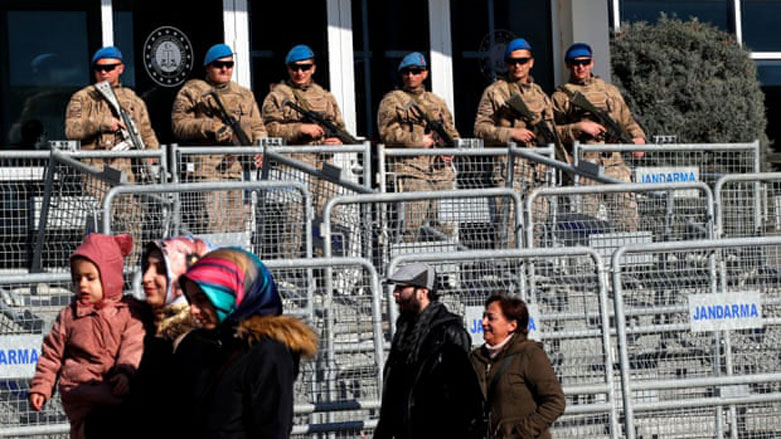Pro-Kurdish party warns situation worsening for political prisoners in Turkey during COVID-19
Turkey’s pro-Kurdish Peoples’ Democratic Party (HDP) warned in a public statement on Tuesday that political prisoners in Turkey who were not included in a general amnesty are facing a worsening situation in prisons amid the COVID-19 pandemic.

ERBIL (Kurdistan 24) – Turkey’s pro-Kurdish Peoples’ Democratic Party (HDP) warned in a public statement on Tuesday that political prisoners in Turkey who were not included in a general amnesty are facing a worsening situation in prisons amid the COVID-19 pandemic.
On March 20, the Committee for the Prevention of Torture (CPT) asked member states of the European Union council to release people detained without sufficient legal basis, including political prisoners, to meet medical and hygienic needs of detainees and convicts, and not to suspend fundamental rights within prisons.
However, the HDP said that although Turkey released 90,000 convicts through a highly controversial amnesty law, it excluded the release of 50,000 prisoners who are jailed on “terrorism-related charges.”
Since the collapse of a peace process between the government and the Kurdistan Workers’ Party (PKK) in 2015, 16,300 HDP members have been detained, with 3,500 of them receiving prison sentences, party officials told the Mezopotamya news agency in November 2019.
This includes Selahattin Demirtas, the former co-chair of the HDP, who was detained and put in prison as part of thousands of arrests made in late 2016 shortly following a failed military coup attempt that Turkey blames on the Fethullah Gülen movement, to which Demirtas is not affiliated.
Demirtas himself has suffered from chronic health conditions, falling unconscious last year. In March, his wife Basak Demirtas called for his release as well as other political prisoners.
“These categorical exclusions prevented the release of about an additional 50,000 prisoners; including thousands of politicians, members of parliament, Kurdish mayors, intellectuals, NGO representatives, human rights activists, students, artists, journalists, and all other political prisoners arrested or convicted with terrorism-related charges,” Feleknas Uca and Hişyar Özsoy, two HDP spokespersons, said in a statement Kurdistan 24 received.
Meanwhile, the opposition Republican People’s Party (CHP) has said it would appeal to the Constitutional Court for the repeal or amendment of the amnesty law.
However, the HDP said it does not anticipate a fair judgment due to the fact the ruling Justice and Development Party (AKP) controls the judiciary.
On April 28, the Justice Ministry said there were 120 COVID-19 cases in four different prisons. But on May 22, the Ministry announced 82 cases in Silivri Prison alone.
However, the HDP believes the number of COVID-19 cases in prisons is much higher. The pro-Kurdish party especially fears that sick prisoners could get infected with the disease.
According to data from the Human Rights Association (IHD), as of March 31, 2020, there were 1,564 sick prisoners across Turkey—of these, 590 were “seriously sick.”
“If the sick prisoner is a political prisoner charged with terrorism-related offences, then his/her release for medical reasons is next to impossible,” the HDP officials said in the statement.
In a report in April, Human Rights Watch (HRW) called on the Turkish government to release prisoners convicted under broadly-enforced antiterrorism laws.
The New York-based human rights watchdog argued that for many of these detainees there was “no evidence they committed violent crimes, incited violence, or provided logistical support” to the outlawed organizations.
The HDP has called on the EU and United Nations human rights institutions to monitor the health situation of political prisoners in Turkey.
“Please closely monitor prisons in Turkey, follow the debates on the appeal process regarding the amnesty law, be the voice of vulnerable prisoners and their families, and mobilize the mechanisms and resources at your disposal to protect the rights and health of prisoners in Turkey and beyond.”
Editing by Karzan Sulaivany